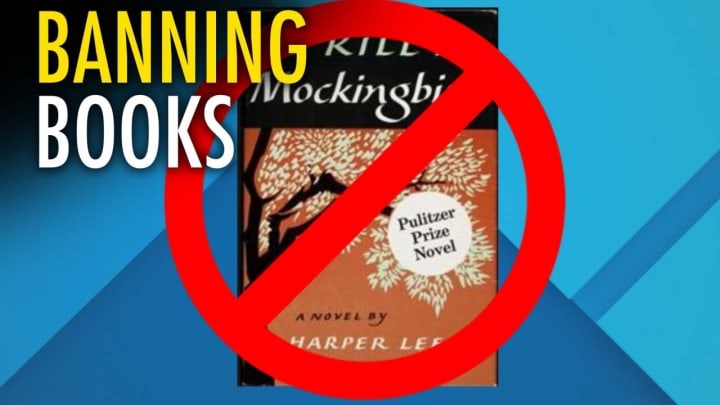What Everyone Gets Wrong About Harper Lee
... my thoughts on Harper Lee, culture wars and recent events

This is something I've been wanting to write about for a long time and recently I've seen things that have made me decide to really make an effort and write it. I was looking for stuff to watch and saw that during lockdown a show called ‘Lovecraft country’ had been popular. I saw Jordan Peele was involved and I enjoyed 'Get Out' and although I don't think I've ever read anything by HP Lovecraft, I've heard of him and his work sounds interesting. This led me to be linked an article in Vox about the show. I was soon informed, via the article, that, among other things, Lovecraft was a huge racist with absolutely no argument, something that the show explores in what sounds like a creative and interesting manner. However, the article then started talking about 'complex literary legacies' in relation to racism, specifically referring to the fact that the central character in the show is named 'Atticus,' which the article claims 'saddles him with a complicated relationship to the flawed white saviour of 'To Kill a Mockingbird.''
Terms such as 'white saviour' are something we come across a lot in modern times, where many texts/films previously seen as anti-racist or non-racist are now reinterpreted as racist. This treatment of literature harks back 1975 with Chinua Achebe's depiction of Joseph Conrad as a 'thoroughgoing racist' in his lecture on 'Heart of Darkness.' Now, I don't want to get into a discussion about this, apart from when it is applied to Atticus Finch, 'To Kill a Mockingbird' and Harper Lee's life, career and views. One way in which I see this is reports of the novel being removed from schools for 'racist language' (a treatment also received by Mark Twain's 'Huckleberry Finn' which also might be considered an anti-racist novel). There seems to be an argument that a novel is racist if it contains racist language, or at least that it shouldn't be taught because of this, even if it's used to depict a certain time and culture in a negative manner.

But it goes deeper than that. This refers to more articles that discuss further what was touched on in the article I cited before. An example of this is an article in 'The New Yorker' a couple of years back that discussed the 'contested legacy' of Atticus Finch. The article discusses the fact that 'To Kill a Mockingbird' is told from Scout's perspective and that this is why Atticus is painted in such an admirable fashion, whilst all the flaws he had are ignored. Flaws that are shared by Lee's father, Amasa Coleman Lee, on whom he was based. But the article also discussed the recent release, 'Go Set a Watchman,' which is told from the perspective of an older Scout and depicts Atticus as more-or-less arguing in favour of Jim Crow laws and being a much more flawed character.
Now, I'd like to talk about both novels in relation to this. Firstly, I'm going to admit that 'To Kill a Mockingbird' is one of my favourite books, and I have an Atticus Finch quote tattooed on my back (something I got before reading ‘Go Set a Watchman’), but what I think everybody gets wrong about this book, both fans of Atticus and those who think he's flawed, is that it isn't a book about racism. I think this focus on the part of the novel where Atticus defends Tom Robinson is thankful in large proportions to the film adaptation, released shortly after the novel's publication. Please don't get me wrong, I think it's a brilliant film, but it misses out a lot of the best parts in the novel. This is just an offshoot of the process of adapting one medium to another, because the film is a message movie, and so makes sense to have this aspect of the novel as the driving force of the plot. But they omit many of the other lessons of the novel. One of these is the scene where Jem is instructed by Atticus to assist the terminally-ill Mrs Dubose in weaning herself of morphine as the last act before she dies, to teach him the meaning of 'real courage.' This is because the novel, fundamentally, is about the moral values of the American South. Lee herself is quoted as saying (in a rare statement on her own opinion on the themes of her novel) 'surely it is plain to the simplest intelligence that [the novel] spells out in words of seldom more than two syllables a code of honor and conduct, Christian in its ethic, that is the heritage of all Southerners.'
I like this quote by the author for a couple of versions of the same reason. Firstly, I like the fact that it acknowledges the importance of Christianity in the novel, as I feel the same people who see the novel as exposing the prejudices of the American South view that form of Christianity that exists there in a negative light (and that's coming from a Catholic), but it is also a definite statement that the novel is not written as anti-Southern values, it is a redemption of those values, an effort to understand the culture in a better light. A culture that, although flawed, is so often misunderstood. And, to me, that has always been what the novel is about.
Then we come to 'Go Set a Watchman,' published a long time after 'Mockingbird,' a time when Lee didn't publish anything else, and shortly before her death. The novel serves as a sequel but was actually the first draft of her more famous novel. Lee was convinced by others that the best parts of the story were those from a child-like perspective, so was encouraged to write the story as a coming-of-age tale instead. Now, to me, that worked very well. But perhaps because of this, Atticus has been misinterpreted on all fronts. He's either "too heroic" or a "white saviour" which can't be seen as a role model.

I like to think that all this reception to Atticus over the years is what convinced Lee to publish 'Watchman,' and I personally do not believe the speculation that says she, as an elderly woman, was coerced into doing so against her will. I enjoyed the book, not being sure what to expect at first, and found it a natural continuation of her themes from an adult point of view. As an adult, Scout is far more inclined to see her father's flaws, but by the end of the novel she sees him as a man, and '[welcomes] him silently to the human race.' She realises that her father's motivations for more of the flawed aspects of his character are tied to the values and morals that she learnt from him as a child, and, although she disagrees with his approach greatly, Atticus tells her he hopes she stands by what she thinks is right and 'stand up to [him] first of all.' It's a grown-up reconciliation between two grown-up family members, and that's because this novel is the grown-up companion piece to its predecessor. It is nowhere near as brilliantly written, clearly still being a draft, but perhaps that, unintentionally, highlights the difference between a child's perspective on something and the more flawed, realistic adult perspective. The title of the book, after all, refers to the watchman as Atticus, a moral compass in Maycomb.
Now this is only my opinion. 'Go Set a Watchman' shocked many people who loved the Atticus of 'To Kill a Mockingbird' and many people who have always seen Atticus as a "flawed white saviour" thought that perhaps Lee wanted to admit they were right and prove it before she died. But that's not quite my reading of the whole thing. Atticus isn't a hero, or a villain. He's a man. Like the culture of the South, he isn't perfect, but through these two books Lee has painted a picture of a good man, and the lessons to be learnt, not just from him, but from disagreeing with him.
There is a lot of disagreement in the world right now, and a great deal of it is generational. My last piece was about the leeway we often give to members of our family that we wouldn’t give to others, and yes, I know Atticus is Scout’s father and Lee was her father’s daughter, but I would urge anyone on either side of the fence about the legacy of Atticus Finch to take another look at his character from this perspective and move towards a world of tolerance in general. And anyone else with an Atticus Finch tattoo who feared they’d suddenly been inked with a racist’s message when ‘Go Set a Watchman’ came out, relax and consider this alternative take.
About the Creator
Matty Long
Jack of all trades, master of watching movies. Also particularly fond of pizza, country music, watching football, travelling, and tea.
X: @eardstapa_






Comments
There are no comments for this story
Be the first to respond and start the conversation.